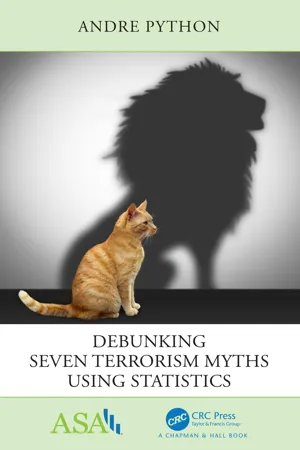
- 160 pages
- English
- ePUB (mobile friendly)
- Available on iOS & Android
Debunking Seven Terrorism Myths Using Statistics
About this book
What is terrorism? What can we learn and what cannot we learn from terrorism data? What are the perspectives and limitations of the analysis of terrorism data? Over the last decade, scholars have generated unprecedented insight from the statistical analysis of ever-growing databases on terrorism. Yet their findings have not reached the public. This book translates the current state of knowledge on global patterns of terrorism free of unnecessary jargon. Readers will be gradually introduced to statistical reasoning and tools applied to critically analyze terrorism data within a rigorous framework.
Debunking Seven Terrorism Myths Using Statistics communicates evidence-based research work on terrorism to a general audience. It describes key statistics that provide an overview of the extent and magnitude of terrorist events perpetrated by actors independent of state governments across the world. The books brings a coherent and rigorous methodological framework to address issues stemming from the statistical analysis of terrorism data and its interpretations.
Features
-
- Uses statistical reasoning to identify and address seven major misconceptions about terrorism.
-
- Discusses the implications of major issues about terrorism data on the interpretation of its statistical analysis.
-
- Gradually introduces the complexity of statistical methods to familiarize the non-statistician reader with important statistical concepts to analyze data.
-
- Use illustrated examples to help the reader develop a critical approach applied to the quantitative analysis of terrorism data.
-
- Includes chapters focusing on major aspects of terrorism: definitional issues, lethality, geography, temporal and spatial patterns, and the predictive ability of models.
Tools to learn more effectively

Saving Books

Keyword Search

Annotating Text

Listen to it instead
Information
Table of contents
- Cover
- Half Title
- Series Page
- Title Page
- Copyright Page
- Dedication
- Contents
- Foreword
- Preface
- Author
- Acknowledgment
- Chapter 1: Introduction: The Role of Statistics in Debunking Terrorism Myths
- Chapter 2: Myth No 1: We Know Terrorism When We See It
- Chapter 3: Myth No 2: Terrorism Only Aims At Killing Civilians
- Chapter 4: Myth No 3: The Vulnerability of the West to Terrorism
- Chapter 5: Myth No 4: An Homogeneous Increase of Terrorism Over Time
- Chapter 6: Myth No 5: Terrorism Occurs Randomly
- Chapter 7: Myth No 6: Hotspots of Terrorism are Static
- Chapter 8: Myth No 7: Terrorism Cannot be Predicted
- Chapter 9: Terrorism: Knowns, Unknowns, and Uncertainty
- Bibliography
- Index
Frequently asked questions
- Essential is ideal for learners and professionals who enjoy exploring a wide range of subjects. Access the Essential Library with 800,000+ trusted titles and best-sellers across business, personal growth, and the humanities. Includes unlimited reading time and Standard Read Aloud voice.
- Complete: Perfect for advanced learners and researchers needing full, unrestricted access. Unlock 1.4M+ books across hundreds of subjects, including academic and specialized titles. The Complete Plan also includes advanced features like Premium Read Aloud and Research Assistant.
Please note we cannot support devices running on iOS 13 and Android 7 or earlier. Learn more about using the app